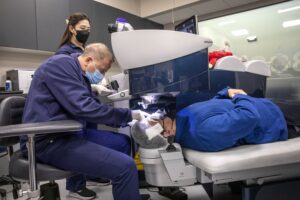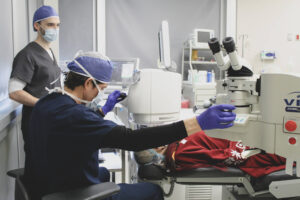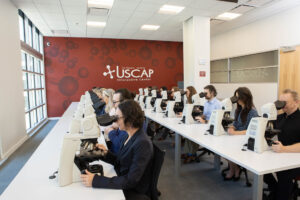That said, out of all of the cataract treatment options, cataract surgery Sydney is by far the most effective. The process involves removing the cloudy lens in the affected eye and replacing it with a new intraocular lens implant to correct the person’s vision.
Do you have obstructive sleep apnea?

Sleep Apnea is a serious sleep disorder, with loud snoring being one of the signs. Symptoms of Sleep Apnea include daytime sleepiness, waking up feeling tired, and snoring all night. Sleep Apnea Solutions and treatments are available such as Continuous Positive Airway Pressure (CPAP) for people with Obstructive Sleep Apnea (OSA). Mild, Moderate, and Severe OSA can be diagnosed by a Sleep Specialist through a Sleep Study. If you have Sleep Apnea, consult with a specialist to discuss treatment options.
Symptoms of OSA include snoring, dry mouth, fatigue, headaches, irritability, lack of focus, night sweats, frequent urination, and sexual dysfunction. CSA is caused by a lack of signals from the brain that control breathing. Treatment for people with Sleep Apnea may include Continuous Positive Airway Pressure (CPAP), sleep studies, and a visit to a sleep specialist. Mild, moderate, and severe Sleep Apnea are all treatable.
While managing SMSF setup costs is important, it is equally crucial to recognize the potential benefits of having an SMSF. These benefits include greater control over investment decisions, the ability to tailor the fund’s investment strategy to individual preferences, and potential tax advantages. However, it is essential to weigh these benefits against the associated costs and to seek professional advice to ensure compliance with regulatory requirements. Understanding the potential SMSF setup costs and the value it can bring allows individuals to make informed decisions regarding their retirement savings strategy.

Sleep apnea, which includes obstructive sleep apnea, central sleep apnea, and severe obstructive sleep apnea, is a serious sleep disorder that can cause people to experience hundreds of episodes of interrupted or stopped breathing each night. Treating sleep apnea can require a combination of therapies, such as continuous positive airway pressure (CPAP) for more severe forms of sleep apnea and milder forms such as mild and moderate sleep apnea.
People with sleep apnea may also be referred to a sleep specialist for further evaluation and to determine the best treatment plan. A sleep study can also be used to diagnose obstructive sleep apnea syndrome and other sleep disorders that cause daytime sleepiness.
Symptoms of sleep apnea include fatigue, poor job performance, irritability, moodiness, depression, and an increased risk of serious health issues. There are two types of sleep apnea: obstructive sleep apnea and central sleep apnea. Severe and moderate obstructive sleep apnea is the most common form. Treating sleep apnea depends on the type and severity. Treatments include CPAP (Continuous Positive Airway Pressure) and sleep study. A sleep specialist can help diagnose and treat sleep apnea. https://syndrme.org/foods-to-take-and-avoid-if-you-have-sleep-apnea/ On this post you can find some foods that you can avoid for minimizing sleep apnea
What Are the Two Forms of Sleep Apnea?
Sleep Apnea is a sleep disorder that affects many people. There are two types: Obstructive Sleep Apnea (OSA) and Central Sleep Apnea (CSA). OSA happens when the muscles in the back of the throat relax, causing the airway to narrow or close. This reduces blood oxygen levels, causing the brain to wake up the sleeper.
Symptoms of OSA include snoring, dry mouth, fatigue, headaches, irritability, lack of focus, night sweats, frequent urination, and sexual dysfunction. CSA is caused by a lack of signals from the brain that control breathing. Treatment for people with Sleep Apnea may include Continuous Positive Airway Pressure (CPAP), sleep studies, and a visit to a sleep specialist. Mild, moderate, and severe Sleep Apnea are all treatable.

Sleep apnea is a disorder characterized by pauses in breathing during sleep. Obstructive sleep apnea is the most common type and occurs when the airway is blocked. Central sleep apnea is less common and is when the brain fails to signal the muscles to breathe. Sleep disruptions prevent people from experiencing the benefits of deep and REM sleep, leading to negative long-term health consequences. A sleep specialist can diagnose, treat, and monitor sleep apnea. Treatments include CPAP, lifestyle changes, and surgery for more severe cases.
Am I at Risk?
Sleep apnea is a sleep disorder in which patients stop breathing while they fall asleep. It can be mild obstructive sleep apnea or treatment-emergent central sleep apnea. People over 50 and those who are overweight are more likely to develop sleep apnea. There is also a risk if there is a family history of sleep apnea. Other existing medical conditions such as congestive heart failure, high blood pressure, Type 2 diabetes, stroke, Parkinson’s disease, polycystic ovarian syndrome, hormonal disorders, and chronic lung diseases such as asthma can also increase risk.
Alcohol, tobacco, sedatives, narcotic pain medications, or tranquilizers can be connected to sleep apnea. Symptoms include loud snoring, and untreated or undiagnosed sleep apnea can lead to high blood pressure. Positive airway pressure and other treatments can diagnose and treat sleep apnea.
How to Start Treatment
Sleep is important for health. Obstructive Sleep Apnea (OSA) is a sleep disorder which can cause high blood pressure and other chronic lung diseases. Signs of OSA include stopping or gasping for air while sleeping. Sleep specialists can diagnose OSA using a Polysomnogram to measure heart rate, breathing, oxygen levels, eye and muscle movements. Home Sleep Tests can also be done. Treatment options include oral appliances, bilevel positive airway pressure, losing weight, and avoiding sleeping pills. To prevent OSA, people should improve their upper airway, avoid daytime fatigue, and practice healthy sleep habits.
What Treatments Are Available?
Sleep health is important for maintaining good blood oxygen levels and preventing high blood pressure, nonalcoholic fatty liver disease, and other chronic lung diseases. Obstructive Sleep Apnea (OSA) causes the upper airway to become blocked, leading to oxygen levels dropping and daytime fatigue. How is Sleep Apnea treated? Depending on severity, lifestyle changes such as losing weight, quitting smoking, and cutting back on alcohol can help.
Sleeping on the side or stomach, using nasal sprays and breathing strips, and using oral appliances prescribed by a clinical sleep medicine specialist are also beneficial. If not effective, Continuous Positive Airway Pressure (CPAP) therapy may be used, involving wearing a mask while sleeping. For Central Sleep Apnea (CSA) Bilevel Positive Airway Pressure (BPAP) or Adaptive Servo-Ventilation (ASV) may be recommended. However, these are not recommended for people with heart failure. Lastly, sleeping pills should not be used to prevent OSA.
Sleep apnea is a sleep disorder that affects people causing daytime sleepiness. There are two types, obstructive sleep apnea (OSA) and central sleep apnea (CSA). Treating OSA requires lifestyle changes, devices, and in some cases, surgery.
Surgery can involve the nose, tongue, palate, bones of the face, neck, and jaw. For CSA, a nerve stimulator, similar to a pacemaker, can be implanted to stimulate the phrenic nerve. Continuous positive airway pressure (CPAP) is the most common device used to treat moderate and severe sleep apnea. A sleep specialist can diagnose and recommend treatment. A sleep study is often suggested to diagnose sleep apnea.
Final thoughts
Signs of sleep apnea shouldn’t be ignored. Speak to your healthcare provider for diagnosis and treatment of sleep disorders like obstructive sleep apnea, central sleep apnea, severe obstructive sleep apnea, moderate obstructive sleep apnea and mild sleep apnea. A sleep specialist may suggest continuous positive airway pressure (CPAP) for treating sleep apnea. A sleep study may be recommended for people with sleep apnea and daytime sleepiness.









